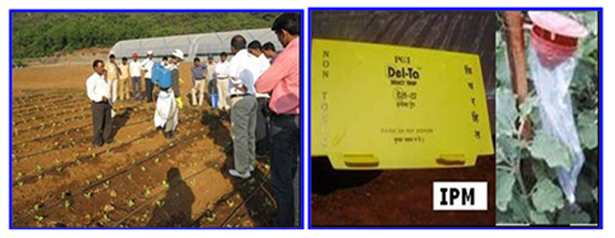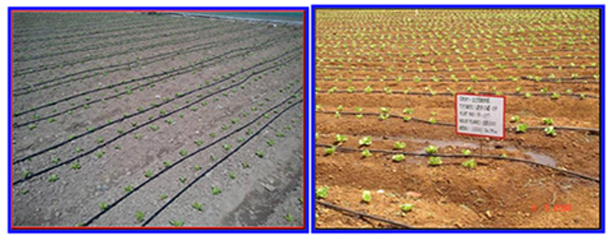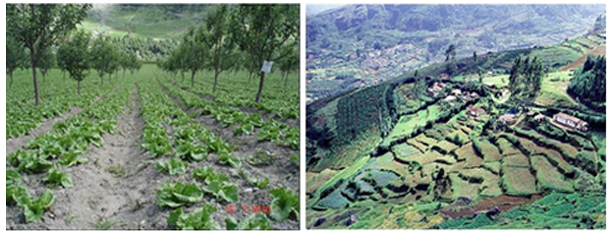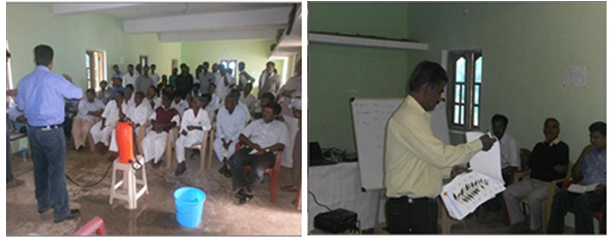- sales@vista-osi-group.com
- +91 22 41471110/1111
Sustainable Sourcing
Make it GREEN
Make it GREEN
At OSI Vista we’re concerned with the impact of our business activity on our world. We strive to maintain a positive and sustainable relationship with the people, the communities and the environments we contact. We work to responsibly manage our business within the social, economic and environmental frameworks in which we operate while continually exploring ways to improve our sustainability impact. Food industry sustainability and our global supply chain sustainability are top priorities. These sustainability efforts are in force throughout our global network and have been recognized by the food industry.
Our Mission is to responsibly manage our business within the social economic and environmental framework in which we operate while continually exploring ways to improve our sustainability impact.
Sustainability Goals
- Social Responsibility
- Provide a safe and diverse work place for our employees and make a positive contribution to the communities we serve
- Economic (Supply Chain)
- Establish standards of excellence for our supply chain and drive innovation in sustainability that will protect and enhance our brand and those of our customers
- Environment
- Comply with or exceed applicable environmental standards while providing initiatives to reduce overall environmental impact from our operations
Vista OSI strives to drive sustainability efforts in the areas of- Human Health & Welfare, Animal Health & Welfare, Climate Change & Energy, Waste, Water, Land, Community Impact and Economics.
OSI Vista Sustainability Achievements(Year 2012)
“Best of Sustainable Supply” Winners Exemplify Commitment to Bettering the Planet, Enriching Communities & Serving High-Quality Food”
OSI Vista was “recognized by one of the Key customer for Best Sustainability practices” for two of its sustainability projects.
The project involving Production and Agricultural Practices was both educational and practical in nature, as OSI Vista worked with farm input companies to teach their growers about the efficient use and environmentally safe handling of farm chemicals and pesticides. The consumption of those materials has increased in Indian agriculture by more than 100% in the last two decades. This training resulted in approved pesticides being used by 100% of the farms used to supply Vista.
The Water Conservation and Micro-irrigation Project involved the education of and assistance to vegetable growers (lettuce and tomatoes) to implement drip and sprinkler irrigation systems versus low-efficiency flood irrigation methods. This has led to lower electricity use, fewer weed problems and less soil erosion.
OSI Vista was one of 51 recipients of the global honor out of 400 entries. A panel of executives and external experts, including BSR, Conservation International, Food Animal Initiative (FAI) and World Wildlife Fund (WWF) of OSI Vista key supplier selected the final 2012 Best of Sustainable Supply winners.
OSI Vista Sustainability Achievements (Year 2014)
“Best of Sustainable Supply” Winners Exemplify the Company’s Commitment to
Partnering with Suppliers that Make a Difference
OSI Vista was named in 2014 Best of Sustainable Supply report for two of its sustainability projects for one more time.
OSI Vista along with its supplier partner’s efforts has implemented an integrated wastewater treatment system that converts wastewater into potable water and recovers methane gas for green fuel. The wastewater treatment system uses gravity to channel discharge water from Vista’s and Pagro’s processing sections toward the wastewater plant. The anaerobic digestion and lagoon treatment treats 80% of wastewater, produces almost no sludge, emits fewer odors, and uses no electric power. This system can handle the effluents from farm vegetable processing and production and requires little space
Discharge water exceeds the biological oxygen demand levels for agricultural use set by the local government, and the facility is rated a “zero” discharge facility because 100% of discharge is used for watering. The company uses the minimal sludge produced in the treatment as manure for a tree plantation and the lawn.
OSI Vista is leading an effort to educate vegetable grower suppliers across India to help them maintain soil fertility and productivity. Vista has developed integrated crop husbandry practices, encouraging crop rotation and fallowing. In some locations, vegetables are an intercrop grown between perennial fruit crops like apples to conserve nutrients and add organic matter to the soil. Farmers have modified cultivation to suit the geography and climate. Micronutrient companies and university labs have helped provide training sessions for farmers in Integrated Nutrient Management (INM).
OSI Vista supplier farms are increasing their use of organic manures, vermi-compost, micronutrients and bio-fertilizers to consistently improve in productivity and product quality, such as freshness and extended shelf life.
A total of 51 entries were recognized from nearly 600 submissions received.
CORPORATE SOCIAL RESPONSIBILITY POLICY
CSR Policy Download
VISTA Introduction-
Vista Processed Food Private Limited (referred to as “Vista” or “Company”) is an OSI (Otto and Sons’ Incorporation) International group company located in APMEA Zone (Asia Pacific Middle East Association). OSI is entrepreneurial company with global interests majorly International in meat, poultry and other value added food processing activities and is one of the largest Meats processing Company in the world.
Vista was incorporated on August 18th 1995, as joint venture and by year 2012, became 100% OSI Group Company. Vista produces various frozen and chilled food products in world class processing plants across the country including in states of Maharashtra, Punjab, Karnataka and Andhra Pradesh.
State-of-the-art food processing plants of Vista produces the vegetable,dough and poultry in Separate processing lines for poultry and vegetable foods and separate fresh produce plants having Capability to produce ready-to-cook quick frozen and chilled foods under most hygienic and stringent sanitary condition meeting International standards, procedures and support services. The plants are certified under HACCP (Hazard Analysis & Critical Control Point)/ ISO 22000/FSSC 22000, Environmental ISO 14001:2004 HALAAL and other areas to ensure compliance with all national, religious and international laws & standards.
Vista is a pioneer in processing formed and coated poultry and Vegetable product in the convenience frozen food and chilled fresh Vegetable processing industry. Vista supplies its products to major brands in domestic and international markets.
At Vista, we are continuously working on product development and tapping possibilities for more products to satisfy the growing demand. With the food processing industry continuing to grow in leaps and bounds, our future plans for growth will be realized through broadening our range of products and continuing to build on our commitment to quality, which we demonstrate both in our constant work to improve existing products and in the careful monitoring what we do to ensure that consistently high standards of quality is maintained.
The concept of Corporate Social Responsibility (CSR) is aligned with OSI internal social responsibility policy and has gained prominence from all avenues. Organizations have realized that Government alone will not be able to get success in its endeavor to uplift the downtrodden of society. With the rapidly changing corporate environment, more functional autonomy, operational freedom etc. Vista has adopted CSR as a strategic tool for sustainable growth. For Vista in the present context, CSR means not only investment of funds for Social Activity but also Integration of Business processes with Social processes.
Vista’s engagement with social, health and educational issues goes back a long time which includes construction of adequate sanitation amenities like washrooms and other facilities for local police stations; medicinal, surgical & hospital equipment aids; Food garins, oil bags & other essential food supplies; Scholerships and educational support to students and many other initiatives.
It has always been the endeavor of Vista to be at the forefront with regard to Social and Environmental responsibility. As a responsible corporate citizen, we aim to contribute to social and environmental causes on a regular basis. For us Corporate Social Responsibility (CSR) is an added opportunity to bring value to our stakeholders lives and in a small possible way bring about a difference that we all want to see and be. We have been contributing to society since various years. Vista has felt the need to establish the principles & coverage of CSR & has accordingly drafted this corporate social responsibility policy.
2. APPROACH AND DIRECTION
Vision and Code of Conduct
Corporate Social Responsibility (CSR) is based on the belief that business sustainability is closely connected to the sustainable development of the communities that the business is a part of and the environment in which the business operates.
Corporate Social Responsibility ("CSR") has always been central to how we do business, starting with operating with integrity in all we do and extending to all the ways we help our clients and communities navigate a complex global economy. We strive to develop innovative programs that leverage the core strengths, capabilities and expertise of our business and our people - and those of our partners - to maximize our impact.
The Corporate Social Responsibility Policy ("CSR Policy") sets out the framework guiding CSR activities and sets out the rules that need to be adhered to while taking up and implementing CSR activities.
The Board shall provide approach and direction towards the following:
- Project Cost - it shall include designing, implementation, monitoring and evaluation cost incurred directly or indirectly on the project
- Administrative Overheads - to ensure that such expenses shall not exceed 5% of the total CSR expenditure of the company for the financial year. Further, these would not include expenses incurred by the Company towards designing, implementation, monitoring and evaluation
- Eligibility of Implementing agencies - to ensure whether those implementing agencies have registered under section 12A and 80G of the Income Tax Act, 1961, have an established track record of at least three years in undertaking similar activities and have also filed form CSR-1 with the Registrar of Companies
- CFO Certification - To satisfy themselves that funds so disbursed have been utilized properly for the purposes and manner as approved
- Impact Assessment - to ensure that impact assessment is carried out by Company, if applicable and the expenditure for such assessment shall not exceed 5% of the total CSR expenditure for the financial year or 50 lakh rupees, whichever is less.
Philosophy:
Our main purpose is to “Make a Difference”. This purpose has defined our reason to exist; we have always believed that we exist to benefit the entire ecosystem of which we are an integral part. We firmly believe that we belong to an interdependent ecosystem comprising Shareholders, Consumers, Associates, Employees, Government, Environment and Society and that we have a commitment to all these stakeholders.
We believe that economic value and social value are interlinked. A firm creates economic value by creating social value – by playing a role in making a difference to the lives of its key stakeholders. Furthermore, a firm cannot do this in isolation; it needs the support and participation of other constituents of the ecosystem. Sustainability comes from win-win partnerships in the ecosystem.
Therefore, our CSR Policy is anchored on the core purpose of “Make a Difference” to the lives of all its stakeholders to help them achieve their full potential.
The Government has notified various initiatives that qualify to be CSR for the purpose of the mandatory spend applicable to companies. The CSR initiatives, for the purpose of such mandatory spend would exclude the benefits made by the Company exclusively or predominantly to its employees, shareholders, investors, creditors and business partners.
FOCUS AREAS AND CSR ACTIVITIES
In accordance with the requirements under Section 135 of the Companies Act, 2013 (“the Act”), Corporate Social Responsibility Rules, 2014 (“the Rules”) and any other applicable provisions of the Act, CSR Activities, amongst others will focus on:
- HUNGER, POVERTY, MALNUTRITION AND HEALTH- Eradicating hunger, poverty and malnutrition, promoting health care including preventive health care and sanitation including contribution to the Swach Bharat Kosh set – up by the Central Government for the promotion of sanitation and making available safe drinking water.
- EDUCATION- Promoting education, including special education and employment enhancing vocational skills especially among children, women, elderly and the differently abled and livelihood enhancement projects.
- GENDER EQUALITY AND WOMEN EMPOWERMENT- Promoting gender equality, empowering women, setting up homes and hostels for women and orphans; setting up old age homes, day care centres and such other facilities for senior citizens and measures for reducing inequalities faced by socially and economically backward groups.
- ENVIRONMENTAL SUSTAINIBILITY- Ensuring environmental sustainability, ecological balance, protection of flora and fauna, animal welfare, agro forestry, conservation of natural resources and maintaining quality of soil, air and water including contribution to Clean Ganga Fund set – up by the Central Government for rejuvenation of river Ganga.
- PROTECTION OF NATIONAL HERITAGE- Protection of national heritage, art and culture including restoration of buildings and sites of historical importance and works of art; setting up public libraries; promotion and development of traditional arts and handicrafts.
- ARMED FORCES- Measures for benefit of armed forces veterans, war widows and their dependants, Central Armed Police Forces (CAPF) and Central Para Military Forces (CPMF) veterans, and their dependents including widows.
- PROMOTION OF SPORTS- Training to promote rural sports, nationally recognized sports, paralympic sports and Olympics sports.
- CONTRIBUTION TO GOVERNMENT FUNDS- Contribution to Prime Ministers National Relief Fund or Prime Minister’s Citizen Assistance and Relief in Emergency Situations Fund (PM CARES Fund) or any other fund set – up by the Central Government for socio – economic development and relief and welfare of Scheduled Castes, Scheduled Tribes, other backward classes, minorities and women.
- TECHNOLOGY INCUBATORS- Contribution to incubators funded by Central Government or State Government or any agency or Public Sector Undertaking of Central Government or State Government, and contributions to public funded Universities, Indian Institute of Technology (IITs), National Laboratories and Autonomous Bodies (established under the auspices of Indian Council of Agricultural Research (ICAR), Indian Council of Medical Research (ICMR), Council of Scientific and Industrial Research (CSIR), Department of Atomic Energy (DAE), Defence Research and Development Organisation (DRDO), Department of Science and Technology (DST), Ministry of Electronics and Information Technology) engaged in conducting research in science, technology, engineering and medicine aimed at promoting Sustainable Development Goals (SDGs).
- RURAL DEVELOPMENT PROJECTS- Strengthening rural areas by improving accessibility, housing, drinking water, sanitation, power and livelihoods, thereby creating sustainable villages.
- SLUM AREA DEVELOPMENT- Strengthening slum areas by improving accessibility, housing, drinking water, sanitation, power and livelihoods.
- DISASTER MANAGEMENT- Disaster management, including relief, rehabilitation and reconstruction activities.
- COVID-19 RESEARCH & DEVELOPMENT- Research & development of new vaccines, medication, and medical devices related to COVID-19 in the firm’s normal course of business
- CAPITAL ASSET- Acquisition or creation of a capital asset provided that it is not owned by the company
- OTHER SCHEDULE VII ACTIVITIES- Various relief & other developmental funds prescribed from time to time by the Central Government pursuant to clause (x) under Schedule VII to the Act.
GUIDING PRINCIPLES:
Pursuant to the definition of Corporate Social Responsibility Policy as mentioned in the amended CSR Rules, guiding principles for selection, implementation and monitoring of CSR activities as well as for the formulation of Annual Action Plan shall form a part of CSR Policy.
The guiding principles shall be as follows:
FOR SELECTION OF ACTIVITIES:
- Eligibility - To check the eligibility of implementing agency through which the CSR activities are selected
- Sustainability - To check whether such implementing agency has a track record of 3 years in undertaking similar programs or projects
- Goodwill – Such implementing agency shall have a goodwill in performing its activities diligently.
- Law of land – the implementing agency shall have a good stand in terms of Law of Land
FOR IMPLEMENTATION & MONITORING:
- Accountability and Transparency – to ensure that the implementing agency is accountable for all the expenses along with the acknowledgements. Further, there should be transparency in the actions to protect the interest of all the stakeholders.
- Ethical Behaviour – to ensure CSR Team as well as employees of the organization shall maintain an ethical behaviour while selecting and implementing CSR programs without any corruption
- No conflict of interest - There shall not be any conflict of interest in the objectives of employees involved in CSR activities and the implementing agencies. Both of them should work for benefits of the needy.
- Respect for stakeholder’s interest - While identifying CSR programs, interest of all the stakeholders shall be taken into consideration.
FOR ANNUAL ACTION PLAN:
An Annual Action plan of the Company to identify the activities and the CSR expenditure to be spent during the year which shall include the details as mentioned in the rules.
Further, the guiding principles required to formulate the Annual Action Plan shall be as follows:
- a. The preference for CSR programs shall be given to local areas and areas around its operations.
- b. CSR programs shall not include activities undertaken as follows:
- i. activities undertaken in pursuance of normal course of business of the company.
- ii. any activity undertaken by the company outside India except for training of Indian sports personnel representing any State or Union territory at national level or India at international level;
- iii. contribution of any amount directly or indirectly to any political party under section 182 of the Act;
- iv. activities benefitting employees of the company as defined in clause (k) of section 2 of the Code on Wages, 2019 (29 of 2019);
- v. activities supported by the companies on sponsorship basis for deriving marketing benefits for its products or services;
- vi activities carried out for fulfilment of any other statutory obligations under any law in force in India;
- c. All the guiding principles as required to be followed for implementing and monitoring the CSR Activities shall also be followed while formulating the Annual Action Plan.
- d. Action plan shall be Simple, Actionable, Measurable, Relevant and Time Bound.
During any financial year, the Annual Action Plan of the Company may be modified to include any unbudgeted expenditure, either on account of new project(s) or due to increase in the outlay for approved project(s), in the following manner:
- Any spending towards CSR shall be approved through CSR Committee.
Subject to the provisions of the Act, the Company may also utilize its CSR spend towards creation or acquisition of a capital asset.
IMPLEMENTATION OF CSR ACTIVITIES:
Subject to the provisions of the Act as applicable from time to time, the Company may carry out its CSR activities:
- (a) Either by itself; OR
- (b) through such Implementing Agencies permitted under the Act; OR
The Company may also collaborate with other companies for undertaking projects or programs or CSR activities in such a manner that the CSR committees of respective companies are in a position to report separately on such projects or programs in accordance with the CSR rules.
Company may build CSR capacities of its own, i.e. of their own personnel, as well as those of their implementing agencies through institutions with a track record of at least three financial years, and any other criterions which the CSR committee, may deem fit.
The surplus, if any, arising out of the CSR activities, programs or projects shall not form part of the business profit of the Company.
OPERATING FRAMEWORK:
A robust and transparent governance structure has been set up to oversee the implementation of the CSR Policy, in compliance with the requirements of the Act and Rules as mentioned above. The CSR activities and projects shall be performed under the supervision of the CSR Committee and in accordance with its directions.
- Expenditure on CSR Projects
The CSR Committee shall recommend to the Board, the total amount of expenditure to be incurred on CSR activities during the applicable financial year and shall seek its one-time approval for the activities under Schedule VII wherein CSR projects/programs will be identified and supported during the course of the financial year, to achieve the targets set out in the CSR Policy. The overall amount to be committed towards CSR will be approved by the Board of Directors as a part of its Annual Action Plan within the Budget and the allocation towards specific CSR initiatives/projects will be approved by the CSR Committee of the Board. All projects undertaken by the Company shall be approved /ratified by the CSR Committee.
The Board has to ensure that at least 2% of average net profit during the three immediately preceding financial year is spent on CSR initiatives undertaken.
All expenditure towards the programs to be diligently documented.
- Modalities of execution of CSR projects
To the extent possible, funding will be given to NGOs or such other entities / organization who will deliver the program according to clear metrics defined in a pre-grant agreement. The CSR Committee will review and approve such projects / programs and approve disbursement of CSR funds to them within the targets set out in the CSR Policy.
Further (in the case of employee engagement & resourcing), employees may freely offer to take part in a task that enhances the service provision of a non-profit / community related organization.
- Implementation of CSR projects
To the extent possible, funding for CSR projects will be for such period as may be determined by the CSR Committee, with potential for future funding contingent on programming and outputs assessed from the interim and final reports.
- Monitoring process for CSR projects
Interim and final report shall be obtained in respect of all grants and stipulated in the grant agreement issued to every partner organisation. The CSR Committee shall report and discuss all important matters which impact the operations of the CSR projects or program or activities (either new or ongoing), including but not limited to the modalities of utilization of funds on such projects and programs and the monitoring and reporting mechanism etc., to the Board. Regular and transparent monitoring will be a key part of implementation to assess if the project progress is on expected lines in terms of timelines in connection to Budgetary expenditure and achievement of targets.
Monitoring will be done with the help of identified key qualitative and quantitative performance indicators, with a continuous feedback mechanism, and recourse for mid-course correction in implementation, if needed, to ensure efficacy.
GOVERNANCE:
Board Level:
The responsibility of CSR is at the level of the Board of Directors of the Company. The Board shall constitute a CSR Committee consisting of the following board members:
- 1. Chairperson
- 2. Members
The Board will have an oversight on the adherence to this Policy. The Corporate Social Responsibility Committee (“CSR Committee”) of the Board, shall assist the Board in the overall governance of the Policy and the CSR Programs pursuant thereto. The CSR Committee shall work under the superintendence and control of the Board. The CSR Committee shall be headed by the Chairman of the Company and shall be responsible to:
- Formulate and approve revisions to the CSR Policy and recommend the same to the Board for its approval;
- Formulate, approve revisions and recommend an Annual Action Plan to the Board for its approval;
- Identify projects of the Company as ‘Ongoing Projects’ and recommend the same to the Board;
- Recommend the annual CSR expenditure budget to the Board for approval;
- Recommend the specific CSR projects to the Board
- Ensure implementation of CSR activities of the Company within the applicable framework;
- Nominate a CSR Team and advise the team for effective implementation of the CSR Programs.
- Set monitoring mechanisms in place to track the progress of each project and track these projects at a half yearly interval
- Undertaking wherever appropriate benchmarking exercises with other corporates to reassure itself of the efficacy and effectiveness of Company’s CSR spends.
- Approve the disclosures which are part of the Annual Report
- Carrying out any other function contained in the Listing Agreement/Listing Regulations, as amended from time to time;
- Performance of such other functions as may be necessary under any statutory or other regulatory requirements to be performed by the Committee and as delegated by the Board from time to time;
All such recommendations or activities of CSR Committee shall be approved by the Board of Directors of the Company.
Composition of CSR Committee is mentioned in Annexure A .
CSR Team:
The CSR Team would play a significant role in implementation of the CSR Programs ensuring that the same are in line with the policy and the purview of the applicable laws governing CSR. The CSR Team will be responsible inter alia for:
Reporting the progress and impact of the CSR Programs at least on a half yearly basis to the Chairman of the CSR Committee.
- Co-ordination with the business function/unit/location and the implementing agencies for successful implementation of the CSR Programs;
- Reporting the progress and impact of the CSR Programs at least on a half yearly basis to the Chairman of the CSR Committee.
MONITORING & IMPACT ASSESSMENT:
The monitoring mechanism to ensure effective implementation of the CSR Programs shall be two-fold, namely:
- i. For such projects having an outlay of Rs. 1 crore or more and a period of one year has elapsed since completion of such project, an Impact Assessment study shall be carried out by an independent agency. The report of such assessment shall be placed before the Board and shall also be annexed to the Annual Report on CSR. Additionally, the CSR team would also endeavour to obtain feedback from the beneficiaries about these Programs. Such feedback would be shared by the CSR Team as a part of the quarterly progress report.
- ii. The CSR initiatives / projects of the Company shall also be reported every year in the Annual Report of the Company.
- iii. The CFO / any Director of the Company shall certify to the Board on an annual basis that the funds disbursed by the Company towards CSR activities have been utilised towards the same effect.
DISCLOSURES:
Regular reporting and disclosure of all CSR and Sustainability activities will be a mandatory component as per the Act. Established reporting mechanisms will be put in place.
A brief summary of CSR projects/programmes/activities will also be included in the Annual Report in the prescribed format as per the CSR rules of the Act.
EFFECTIVE DATE:
The Effective Date of this ammended CSR Policy shall be with effect from 01st April, 2021.
LIMITATION AND AMENDMENT:
The Board of Directors may in their discretion and on recommendation of the CSR committee, make any changes/modifications and/or amendments to this Policy from time to time.
Requirements with respect to quorum, notice of meeting, documentation, etc shall be in conformity with the applicable Secretarial Standards issued by the Institute of Company Secretaries of India and approved by the Central Government, unless expressly stated otherwise.
In the event of any conflict between the provisions of this Policy and of the Act or Listing Regulations or any other statutory enactments, rules, the provisions of such Act or Listing Regulations or statutory enactments, rules shall prevail over and automatically be applicable to this Policy and the relevant provisions of the Policy would be amended/modified in due course to make it consistent with the law.


















